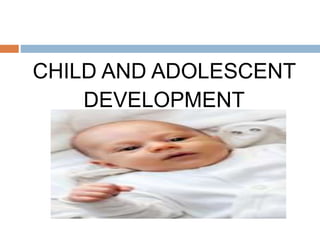
CHILD AND ADOLESCENT.pptx
- 2. Child and Adolescent Development I. Basic Concepts and Issues of Human Development II. Developmental Theories and other relevant Theories III. Development of the Learner at Various Stages
- 4. I. Basic Concepts and Issues of Human Development Definition: Human Development is the pattern of movement or change that begins at conception and continues through the life span. It includes growth and decline.
- 5. 1. Development is relatively orderly. a. Proximodistal b. Cephalocaudal Some major principles of human development
- 7. 2. While pattern of development is likely to be similar, the outcomes of developmental processes and the rate of development are likely to vary among individuals.
- 9. 4. Development as a process is complex because it is the product of biological, cognitive and socioemotional processes.
- 10. a. Biological b. Cognitive c. Socio-emotional
- 11. Two approaches to Human Development 1.Traditional Approach 2. Life-span Approach
- 12. Stages of Development 1. Pre-natal (conception to birth) 2. Infancy (from birth to two years) 3. Early childhood (3 to 5 years) 4. Middle and Late Childhood ( 9-12 years) 5. Adolescence (13-18 years) 6. Early Adulthood (19-29 years) 7. Middle Adulthood (30-60 yrs) 8. Late Adulthood (61 yrs above)
- 13. Developmental Task define - One that arise at a certain period in our life, the successful achievement of which leads to happiness and success with later tasks while failure leads to unhappiness, social disapproval, and difficulty with later tasks.
- 14. Developmental Tasks (Santrock,2002) 1. Pre-natal- It involves tremendous growth from a single cell to an organism complete with brain and behavioral capabilities.
- 17. 2. Infancy- A time of extreme dependence on adults. 3. Early childhood- Children learn to become more self sufficient.
- 18. 4. Middle and late childhood- The fundamental skills in reading, writing and arithmetic are mastered.
- 19. 5. Adolescence- Begins with rapid physical changes. Pursuit of independence and identity are prominent.
- 20. 6. Early adulthood- It is a time of establishing personal economic independence.
- 21. 7. Middle Adulthood- It is a time of expanding personal and social involvement and responsibility.
- 22. 8. Late Adulthood- It is a time for adjustment to decreasing strength and health, life review, retirement and adjustment to new social roles.
- 23. Activity Answer this question: What are the implications of these developmental tasks to your role as a facilitator of learning? 1. Preschool 2. Middle and Late Childhood 3. Adolescence
- 24. Issues on Human Development 1. Nature vs Nurture 2. Continutiy vs Discontinuity 3. Stability vs Change
- 25. Factors Affecting Development 1. Maternal Nutrition 2. Child Nutrition 3. Early Sensory Stimulation
- 26. Factors that Affect growth 1. Genetic History 2. Nutrition 3. Medical Conditions 4. Exercise 5. Sleep 6. Emotional Well-Being
- 27. II. Developmental Theories 1. Sigmund Freud’s Psychosexual Theory Stages of Psychosexual Development
- 29. 2. Piaget’s Cognitive Development Theory Activity: Situation 1. It’s Christmas and Uncle Boboy is giving “aguinaldo” to the children. Three year old Allen did not want to receive the five hundred peso bill. And instead he prefer to receive five 20 peso bills. His ten year-old cousins were telling him its better to get the one five hundred peso bill, but they failed to convice him.
- 30. Situation 2. Sibling, Harvey 10, Harold 8 and Hannah, 4 were sorting out their stuffed animals. They had 7 bears, 3 dogs, 2 cows and 1 dolphin. Mommy, a Psychology teacher, enters and says, “Good thing you’re sorting those. Do you have more stuffed animals or more bears?” Harvey and Harold says, “stuffed animals.” Hannah says “Bears.”
- 31. Situation 3. While eating on her high chair, seven-month old Liza accidentally dropped her spoon on the floor. She saw mommy pick it up. Liza again drops her new spoon and she does this several times more on purpose. Mommy didn’t like it at all but Liza appeared to enjoy dropping the spoon the whole time.
- 32. Analysis 1. Why do you think did Allen prefer the 20 peso bill? 2. Why do you think Hannah answered “Bears”? What does this say about how she thought to answer the question? 3. Why do you think baby Liza appeared to enjoy dropping the spoons?
- 36. 4.Kohlberg’s Stages of Moral Development
- 37. Activity: Read the moral dilemma below. Ryan, 17, has been saving up money to buy a ticket for this concert of rock band. His parents have discouraged him from going as the concert will surely be with a rowdy crowd. The band is notoriuos for having out-of-contyrol audience who somehow manages to get drunk and stoned during the concert. Ryan agreed not to watch anymore. But a day before the concert, Nic, 15 year old brother of Ryan, saw a corner of what appeared to be a concert ticket showing in the pocket of Ryan’s bag. Nic examined it and confirmed it was indeed a ticket. Looking at Ryan’s bag, Nic also found an extra shirty and 2 sticks of marijuana. So he figured ryan will go to the concert after all. That night, Ryan told his parents that he will be spending tomorrow nioght at a classmate’s house for a school requirement. Then later that evening, he told Nic of his plan to go to the concert. Nic didn’t say anything, but he found it difficult to sleep that night, thinking whether to tell their parents or not.
- 38. Questions: 1. If you were Nic, what would you do? 2. Why would you choose to do that? What were the things you considered in deciding what to do?
- 43. 6. Brofenbrenner Bio ecological Theory
- 46. Development of the Learners at Various Stages